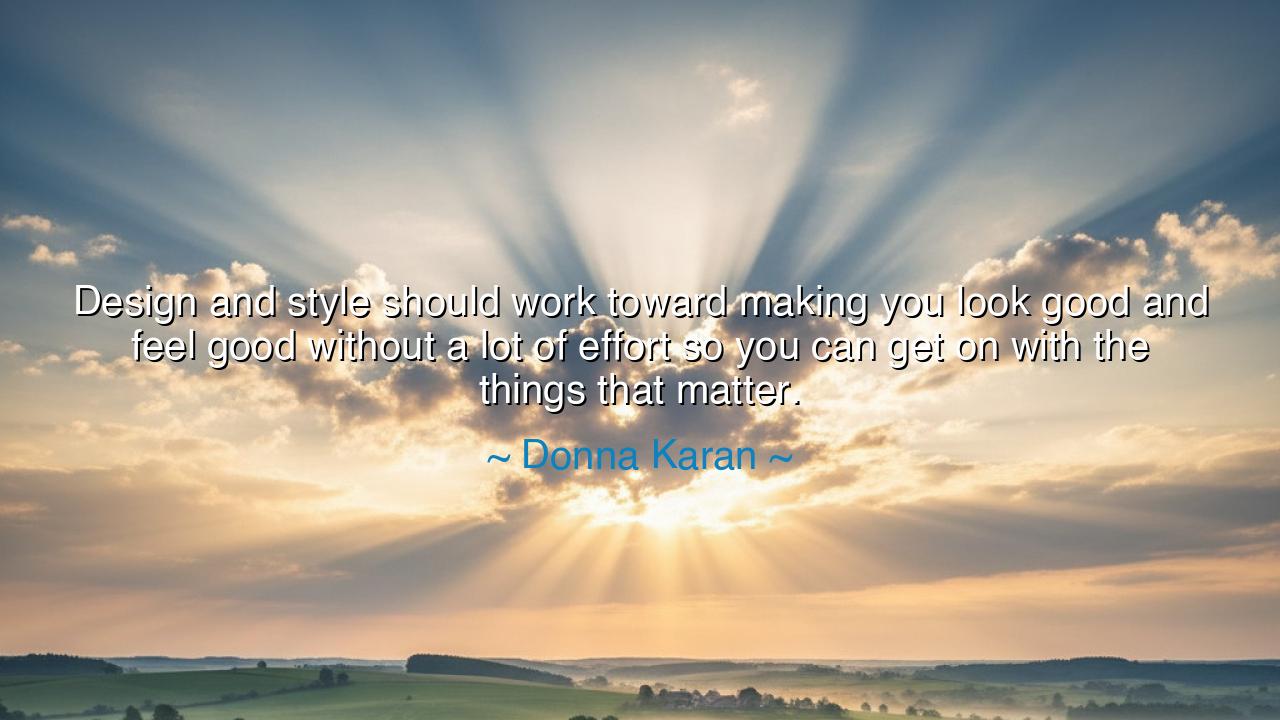
Design and style should work toward making you look good and feel
Design and style should work toward making you look good and feel good without a lot of effort so you can get on with the things that matter.






“Design and style should work toward making you look good and feel good without a lot of effort so you can get on with the things that matter.” – Donna Karan
Hear these words, O seekers of grace and purpose, spoken by Donna Karan, a master of form and function, whose craft lies not only in clothing the body but in freeing the spirit. In this saying, she offers a truth that transcends the world of fashion and reaches into the very heart of living: that design and style are not ends in themselves, but servants of the soul. She reminds us that what we wear, what we surround ourselves with, should not enslave us in vanity or distraction. Rather, they should liberate us—to look good, yes, but more importantly, to feel good—so that we may devote our energy to the deeper pursuits that give life meaning.
When she says that style should “work toward making you look good and feel good without a lot of effort,” she speaks of harmony—the sacred balance between the outer and the inner. The true purpose of design, she teaches, is not to dazzle, but to simplify; not to demand attention, but to grant ease. For when design is wise, it aligns with the rhythm of life itself: smooth, graceful, effortless. The wearer does not serve the garment; the garment serves the life of the wearer. This is the wisdom of functional beauty, of elegance born from purpose, where comfort and confidence walk hand in hand.
Consider, O listener, the example of the ancient Greeks, whose architecture and art embodied this same principle. Their temples were not overloaded with decoration, yet they stirred awe in all who beheld them. Their sculptures balanced strength and serenity, capturing motion without strain. In their philosophy, beauty was the reflection of order and simplicity—that which elevated the mind without burdening it. So too, Donna Karan’s teaching follows this lineage of thought: that true beauty is effortless because it is authentic. When we wear what fits our lives, our movement, and our truth, we become harmonious with ourselves, and in that harmony lies both grace and power.
Karan’s words also reflect her own story—a designer shaped by the fast-paced heart of New York, where people rush between dreams and duties. She saw the modern woman, burdened by the weight of expectation, needing not costumes but armor—clothing that empowers rather than confines. Her vision was not of fashion for its own sake, but of design as a tool for freedom. In creating garments that could move with the body, that could adapt from morning to night, she practiced what she preached: that good design should serve life, not the other way around. Hers was a revolution of practicality infused with art—a restoration of dignity in the everyday.
This idea, simple yet profound, extends beyond clothing to all forms of creation and living. The architect, the teacher, the leader—all are designers in their own right. If their work demands endless struggle to use or understand, it fails its purpose. True mastery lies in making the complex feel simple, in shaping the world so that others may move through it freely. The sculptor Michelangelo once said that his task was not to carve beauty into the marble, but to release it—to remove the excess that imprisoned it. So too must we remove the unnecessary from our lives—be it clutter, vanity, or pretense—until only what is essential remains.
In a deeper sense, Karan’s wisdom is a call to self-knowledge. To “look good and feel good” is not vanity, but balance. It means honoring the self—your form, your taste, your spirit—without losing sight of what truly matters. When we dress or design without awareness, we become servants to trends and opinions. But when we choose with intention—with ease, authenticity, and clarity—we embody confidence without arrogance, simplicity without emptiness. Then we are free to focus our energy not on appearance, but on contribution, compassion, and creation.
So let this be your guide, O listener: let your designs, choices, and habits serve your higher purpose. Seek elegance not in extravagance, but in alignment—where every action, every object, every word harmonizes with who you are and what you love. For when style ceases to be a burden and becomes an expression of truth, it no longer distracts from life—it enhances it.
And thus, as Donna Karan teaches, beauty is not in adornment, but in ease. Let your life be designed with such grace that you move through the world effortlessly, your outer form reflecting your inner peace. Then, freed from struggle and pretense, you may turn your gaze toward the things that truly matter: love, purpose, and the art of simply being.






AAdministratorAdministrator
Welcome, honored guests. Please leave a comment, we will respond soon